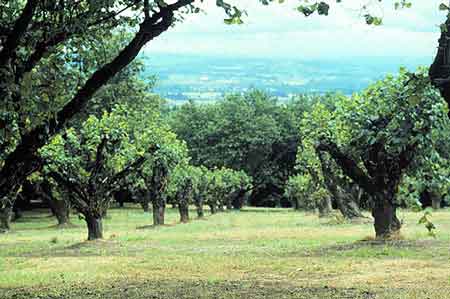Jay W. Pscheidt, Jeff Olson, Steve Morgan
Much of the Oregon hazelnut industry was planted using 'Barcelona' trees with 'Daviana' pollinizers. The 'Daviana' trees are very susceptible to EFB and should be removed from orchards. 'Barcelona' is more resistant than 'Daviana' but can become severely diseased over a longer exposure time. Replacement of susceptible pollinizers with more resistant types lowers the overall risk from EFB.
Hazelnut growers who have been living with EFB in their orchards were asked about the need for susceptible pollinizer replacement.
Many growers regretted not removing them sooner in their overall EFB management scheme.
It was once thought that rotational dehorning of susceptible pollinizers might help slow disease spread in a 'Barcelona' orchard.

Several trees have been dehorned in the middle of this orchard in an attempt to control EFB. Dehorning is not recommended due to numerous disadvantages.
Dehorning may be useful for pruning heavily infected trees, but it is not a recommended practice for pollinizer management. A dehorned 'Daviana' is not any less susceptible and will not contribute significant amounts of pollen for 3 to 4 years.
Tree replacement in a mature orchard is not an easy task. Lack of adequate sunlight and moisture stress are the two largest factors to overcome. Not only does the pollinizer need to be removed but also adjacent 'Barcelona' limbs need to be pruned since they will fill in the vacant space. Increased sunlight is good for a new tree but may result in sun scald on exposed, unprotected 'Barcelona' trunks and scaffold limbs. Wood rot organisms may also colonize limbs with large cuts. Lack of pollen production also needs to be considered when planning a replacement strategy. One way to increase the total amount of pollen produced by compatible pollinizers is to place additional trees around the outside edges of the orchard. They can grow vigorously in full sun, and produce larger amounts of pollen faster than trees within the orchard.
'Hall's Giant', 'Lewis', 'J-5' and "Gamma" are pollinizers which are compatible with 'Barcelona'. 'Hall's Giant' has been useful since it is less susceptible to EFB and grows fairly well in established orchards. The VR series have a single dominant resistance gene to EFB but are not as desirable since some do not set nuts. The pollenizers Delta, Epsilon, Gamma and Zeta were released in 2002 and also have the single dominant resistance gene to EFB.
Unfortunately, new strains of the EFB fungus have developed that can overcome the Gasaway gene for resistance.
